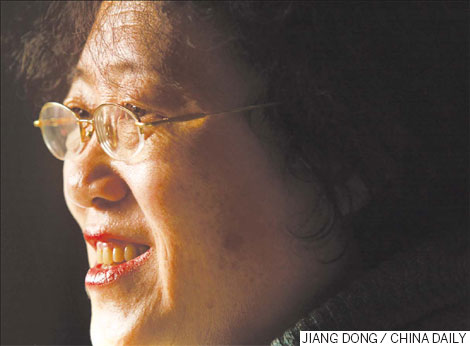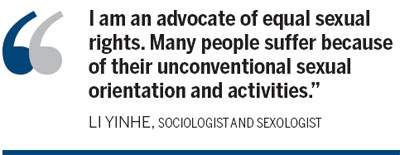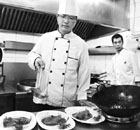Profiles
Spicy views from a soft-spoken widow
By Wang Ru (China Daily)
Updated: 2010-05-11 07:59
 |
Large Medium Small |
Outside, in her small courtyard, are trees, shrubs and flowers, all lovingly planted by Li Yinhe.

But you'd be wrong to think that Li, at 58, is a shy and retiring type planning to spend the rest of her days reading books and tending to her garden.
Li is one of China's best known sociologists and sexologists who has caused much controversy for her ardent support for the rights of lesbians and gays, and non conventional sexual activities such as prostitution, wife-swapping and orgies.
"I prefer to live a peaceful life," Li said, but being an activist in such controversial fields has meant facing moral outrage and criticisms.
She has also been consulted by those similarly affected. For example, a couple of years ago, a group of middle-class elites - all of whom shared the same fetish of sadomasochism - came to visit her.
"I didn't feel weird in any way talking with them," Li said.
And recently, she received a call from a Nanjing professor, surnamed Ma, who was arrested for organizing wife-swapping orgies.

"Some people like to eat scorpion; you may not but you should not punish those who do because they do things you don't like doing."
Li, whose husband Wang Xiaobo, the poet and author, died in 1997, denied she was an advocate of China's sex revolution.
"I am an advocate of equal sexual rights," she said. "Many people suffer because of their unconventional sexual orientation and activities."
But Li does not agree people should have total sexual freedom. "I don't suggest people have a great many sexual partners," she said.
"The more active people are in having sex with strangers, the greater the risk of being infected with an STD or HIV/AIDS."
Li, who was born in Beijing in 1952, was sent to work in a rural area of the Inner Mongolia autonomous region for five years after 1969.
In 1977, she became an editor of a government newspaper and later, a researcher at the Chinese Academy of Social Sciences, where she is now a professor.
In 1980, she married Wang. Two years later, she went to the United States and in 1988 obtained her PhD in sociology from the University of Pittsburgh.
In 1989, when Li was researching the situation of bachelors in urban Beijing, she posted an advertisement in a newspaper. A young man responded and confessed he was a homosexual.
It was the first time Li met a homosexual. Since then, she began focusing on the area and started visiting homosexuals to record their experiences.
In 1991, her first book on homosexuality, Their World: a Study of Homosexuality in China, was published in Hong Kong. Two years later, it was published on the Chinese mainland.
Li believes same-sex marriages will eventually be legalized in China as the people are "more tolerant toward homosexuals" than the government. "Besides, unlike Western countries, there isn't much religious opposition to it."
Li, who describes herself as a feminist - but "not the radical kind" - said China has done much better in this field than many other countries.
"I advocate equal rights between male and female," she said.
She would like adults to have the right to use pornography products, although the government needs to protect juveniles from using them.
"It is simply lazy to eliminate all porn products from society," she said.
Li now spends much time in research projects funded by the academy, and in writing books.
Her latest study focuses on the transformation of family structure of the five cities in China. The three-year project has surveyed 4,000 families from the cities.
Li has published other books including Rising Power of the Women; Sexuality and Love of Chinese Women; Subculture of Homosexuality and Subculture of Sadomasochism.
In 2003, 2005 and 2006, she submitted proposals to the Chinese People's Political Consultative Conference to legalize same-sex marriages. None succeeded.
In 2006, she spoke at an international conference in Montreal on the rights of gays, lesbians, bisexuals and transsexuals.
Recently, she started an online magazine, selecting articles from all sources. She named the e-magazine Galaxy, a literal translation from her name, Yinhe.
She also keeps contact with many friends of different sexual orientations.
"They are people as normal as you and me," Li said. "That's why I have been calling for legal rights to protect these people."







